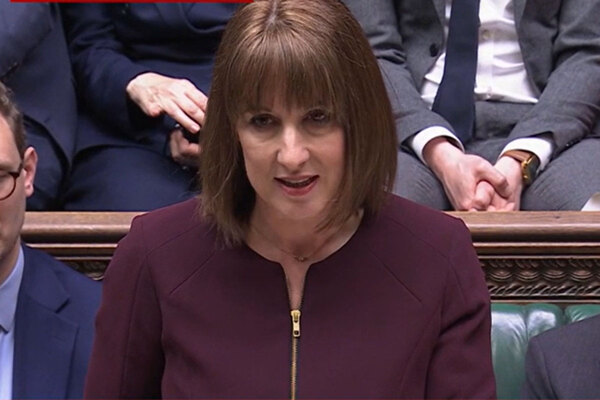Spring Statement: the sector’s response
Chancellor Rachel Reeves announced that Labour may be on track to build 1.3 million homes, while confirming welfare cuts for millions of people. Jenny Messenger rounds up responses from the sector
In her Spring Statement speech to the House of Commons on Wednesday, Ms Reeves revealed the Office for Budget Responsibility (OBR) is now predicting that 1.3 million homes could be built between 2025-26 and 2029-30, with the potential to hit a “40-year high of 305,000 per year” at the end of that period.
The estimates – based on the government’s planning reforms – would put Labour “within touching distance” of its 1.5 million target, Ms Reeves said,
Based on this, Labour’s actions appear to be working. The OBR expects planning reforms to “increase net additions by 170,000”, driven by the extra requirements placed on local authorities to release land for development.
However, the OBR said there are “several significant uncertainties” around the estimate, with the potential for capacity constraints in the housebuilding sector to hamper delivery.
The Spring Statement also included announcements made earlier this week. These include an extra £2bn for the Affordable Homes Programme (AHP), a £600m construction skills package to train up to 60,000 more skilled workers and £20m for a fund to help community groups build more affordable homes.
The welfare budget was hit, with the OBR anticipating the cuts will affect more than three million people and save £3.4bn.
Now, the sector is looking to the Spending Review in June to see whether the government delivers some long-term certainty.
Here are some key sector responses to the Spring Statement.
A government that is ‘alive’ to the sector’s challenges
Housing associations welcomed the extra £2bn to the AHP, but are now eagerly awaiting the Spending Review for those fundamental, in-depth commitments to housing.
Kate Henderson, chief executive of the National Housing Federation, said the announcements showed that “delivering new social housing is intrinsic to the government’s plans for growth”.
She said: “Housing associations are ready to work with the government to deliver a generation of new social homes.
“We hope to see a significant increase in funding for affordable housing at the Spending Review, alongside a package of support to help the social housing sector rebuild capacity, so we can build the homes we desperately need.”
Rachael Williamson, interim director of policy, communications and public affairs at the Chartered Institute of Housing (CIH), also welcomed the funding. But she flagged that the OBR’s analysis showed “the government will struggle to meet its target of building 1.5 million homes without significant investment in social and affordable homes”.
“As we look towards the Spending Review in June, it is vital that government continues its work to develop a long-term successor to the AHP that prioritises homes for social rent, and delivers the level of funding that is required to tackle soaring levels of homelessness,” Ms Williamson added.
Catherine Ryder, chief executive of PlaceShapers, a membership body for medium-sized, geographically concentrated housing providers, said: “The focus on new homes is welcome and members are already sharing examples of homes that can be built immediately with this funding.
“Ahead of the Spending Review, we are also urging the government to focus on the critical role of housing-led regeneration in making the commitment to a decade of national renewal a reality.”
Mark Perry, chief executive of Vivid, a Portsmouth-based housing association, said the fresh financial commitments showed that “the government’s alive to the challenges we’re facing”.
He said: “We hope this latest £2bn of investment really is a Treasury down payment; if the government wishes to see further progress made in tackling our housing crisis, it’s vital the sector receives significant funding in June’s Spending Review.”
And despite Ms Reeves’ “optimism around the impact of national planning policy changes on housing delivery”, planning reforms alone will not be enough, Mr Perry added.
Stephen Sorrell, social partnership director at Preferred Homes, an extra-care for-profit housing provider, said the extra funding “should help maintain momentum while we await news of the replacement for the Affordable Homes Programme in June”.
He said: “For us, four of our eight initial affordable rent extra-care housing developments were potentially set to be delayed by a year. Extrapolate this across the sector and you get a sense of how significant the new funding can be.”
Concerns over welfare reforms
Josie Parsons, chief executive at Local Space, said the £2bn is welcome in terms of unlocking housing delivery, but that issues remain around funding for tackling homelessness, especially with the welfare changes.
Ms Parsons urged the chancellor and Angela Rayner, deputy prime minister and housing secretary, “to enhance homelessness budgets” and “review the impact of some of the planned welfare changes”.
Some of the £2bn could also be diverted “into rapidly scaling-up the supply of high-quality temporary accommodation until the much-needed new social housing becomes available”, Ms Parsons said.
Greg Reed, group chief executive of Places for People, described the extra funding as a “sensible investment”, but raised concerns about “the impact of the proposed welfare reforms as many of our customers already struggle to afford the essentials”
“Government has listened to our sector, but our voice must remain heard when times get tougher for communities,” he said.
“A third of our social housing customers couldn’t work last year due to disability or long-term sickness. One in four struggled with debt, or couldn’t afford to put the heating on.”
Nicholas Harris, chief executive of Stonewater, said the “challenging political and economic landscape” was being reflected in “tough policy decisions” being made.
“Many of these decisions are impacting customers, particularly those reliant on benefits, and it’s clear the need for housing for vulnerable people has never been greater,” he said.
“The £2bn investment in social and affordable homes is a positive step, however, while it is a welcome commitment, it’s crucial to acknowledge that it’s one piece of a larger puzzle.”
June’s Spending Review is a “critical moment for the government to outline its vision and reiterate its commitment to housing”, Mr Harris added.
Ms Williamson of the CIH said: “Beyond housing, we share the concern of charities and consumer groups that cutting benefits will place more people into hardship.
“The cost of living continues to be a persistent challenge for those who have the least, and we need to see more support delivered through the welfare system for those who need it, not less.”
Fair distribution of funding
Jonathan Higgs, chief executive of Raven Housing Trust, a Surrey-headquartered association, said: “While Thanet, Sunderland and Swindon were named in the statement, we urge the government to ensure this funding is distributed fairly across the country. Areas like Surrey and Sussex are under acute housing pressure, and with the right support, housing associations like ours can respond rapidly to local need.”
Tracy Harrison, chief executive of the Northern Housing Consortium, reiterated the organisation’s call for investment in brownfield land in the North and a focus on place-based regeneration.
“Our members are regulated on the quality of their homes and their service to customers, and rightly must prioritise finite resources to these areas,” she said.
“This means that long-term funding for improving existing homes and places will unlock more investment and capacity for building the new homes that the sector is so keen to support with.”
In the capital, Claire Holland, chair of London Councils, said the “crisis in town hall finances is holding us back” and calls for public services to be reformed.
“Without this, we risk more and more boroughs entering effective bankruptcy – a situation which would undermine economic confidence, hold back growth and cost the public purse more in the long run,” she stated.
London Councils said there are “around 300,000 potential new homes with planning permission granted by London boroughs that have not yet been built” due to construction costs and insufficient funding for infrastructure and affordable housing.
John Dickie, chief executive of BusinessLDN, said the chancellor has made the right move by not “cutting capital spending to balance the books”.
“All eyes will now be on how the government will use its limited firepower to deliver a Spending Review that crowds in private investment, alongside an industrial strategy that ensures all parts of Whitehall are pulling in the same direction on growth,” he said.
“This should include a more ambitious Affordable Homes Programme building on recent announcements, a long-term funding deal for Transport for London that helps keep the capital moving, and greater power and resources for the city so that it can deliver growth for Londoners and the UK more effectively.”
The Scottish Federation of Housing Associations (SFHA) called for increased investment in the country’s affordable homes programme and voiced “serious concerns” over social security cuts following the Spring Statement.
The SFHA said if there any Barnett formula consequentials – meaning the extra funding that must go to devolved administrations when increases in public spending are announced – as a result, the funding “must be reinvested into Scotland’s affordable homes programme”.
Sally Thomas, chief executive of the SFHA, said: “Following the chancellor’s Spending Review in June, we also need to see the UK and Scottish government commit to a multi-year funding settlement for Scotland’s Affordable Housing Supply Programme.”
It is not yet clear if Scotland will see cuts to social security as well.
Ms Thomas added: “Housing associations are already on the frontline of mitigating some of the worst effects of our underfunded and poorly designed social security system, they know from experience the severe damage cuts have on social tenants.
“Plunging more disabled people into deeper hardship is likely to lead to health conditions worsening and people being less able to engage with support, training and trying to return to work where and if they can.”
‘You can’t house a family of four in a planning consent’
While the chancellor might have lauded the impact of Labour’s reforms to the National Planning Policy Framework (NPPF), some are more sceptical.
Jonathan Werran, chief executive of Localis, a thinktank, said: “The news that day-to-day spending will be protected in the forthcoming Spending Review means that there will be no chainsaw wielding or DOGE-like [Department of Government Efficiency] activity in Whitehall.
But despite the NPPF changes that “come at no apparent fiscal cost to help deliver 1.3 million new homes in the next five years”, the government "will face the stubborn reality that you can’t house a family of four in a planning consent”.
Mr Werran said: “We must hope the requisite labour, material and skills and other infrastructure elements, whether energy, transport or water, can also materialise in line with regional strategic planning ambitions and the onward march of English devolution.”
Melanie Leech, chief executive of the British Property Federation, called on the government to go further with its reforms “in the context of regulating for growth”.
She welcomed “commitments to maintain capital spending on infrastructure and day-to-day government spending, alongside new funding to support construction skills”.
But Ms Leech said that “delays caused by the Building Safety Regulator are still blocking new home delivery, pension funds need to be allowed to invest more in UK property, and further planning reform is needed to make it easier for institutional money to fund more social and purpose-built private rented homes”.
“We need the whole industry to be firing on all cylinders, including our under-resourced planning departments. That means 3,000 more planners rather than the 300 that have been pledged, and we would urge government to consider how its transformation fund can be used to enhance skills and capacity,” she added.
Ben Beadle, chief executive of the National Residential Landlords Association, called the Spring Statement a “missed opportunity to support renters across the country”.
“It has done nothing to tackle the chronic shortage of rental housing to meet demand,” he said. “And it has done nothing to address the unjust freeze on housing benefit, which is leaving so many renters fearful of how they will afford their rents.”
‘A decisive investment in the UK’s built environment’
Justin Young, chief executive of the Royal Institution of Chartered Surveyors, said the chancellor’s announcements for the housing sector was “an enormous boost”.
“The £600m of additional funding for construction sector skills is a decisive investment in the UK’s built environment,” he added.
“This should help secure the next generation of construction sector workers and professionals, as we look to tackle the challenge of an aging workforce alongside acute labour and skills shortages.”
Brian Berry, chief executive of the Federation of Master Builders, cautioned that the funding to train 60,000 new construction workers – though welcome – fell short of the estimated 250,000 more construction workers the Construction Industry Training Board estimates are needed by 2028.
“The numbers of workers don’t go far enough, and the announcement of 1.3 million new homes by the end of this parliament seems to be a clear indication the original target was a step too far,” he said.
Mr Berry added: “Now, more than ever, we need to see the government support the nation’s SME house builders, so that homes can be delivered by a healthy market and not just a few companies at the top of the tree.”
Sign up for our daily newsletter
Already have an account? Click here to manage your newsletters
Sign up to the Social Housing Finance Conference 2025
The Social Housing Finance Conference on 14 May will explore the future of investment models, the viability of social housing in 2025, innovative funding solutions to address the housing crisis and more.
Join more than 450 chief financial officers, finance directors and senior professionals from housing associations, local authorities, banks and investment firms for high-impact networking and cutting-edge insights on tackling the sector’s biggest financial challenges.













